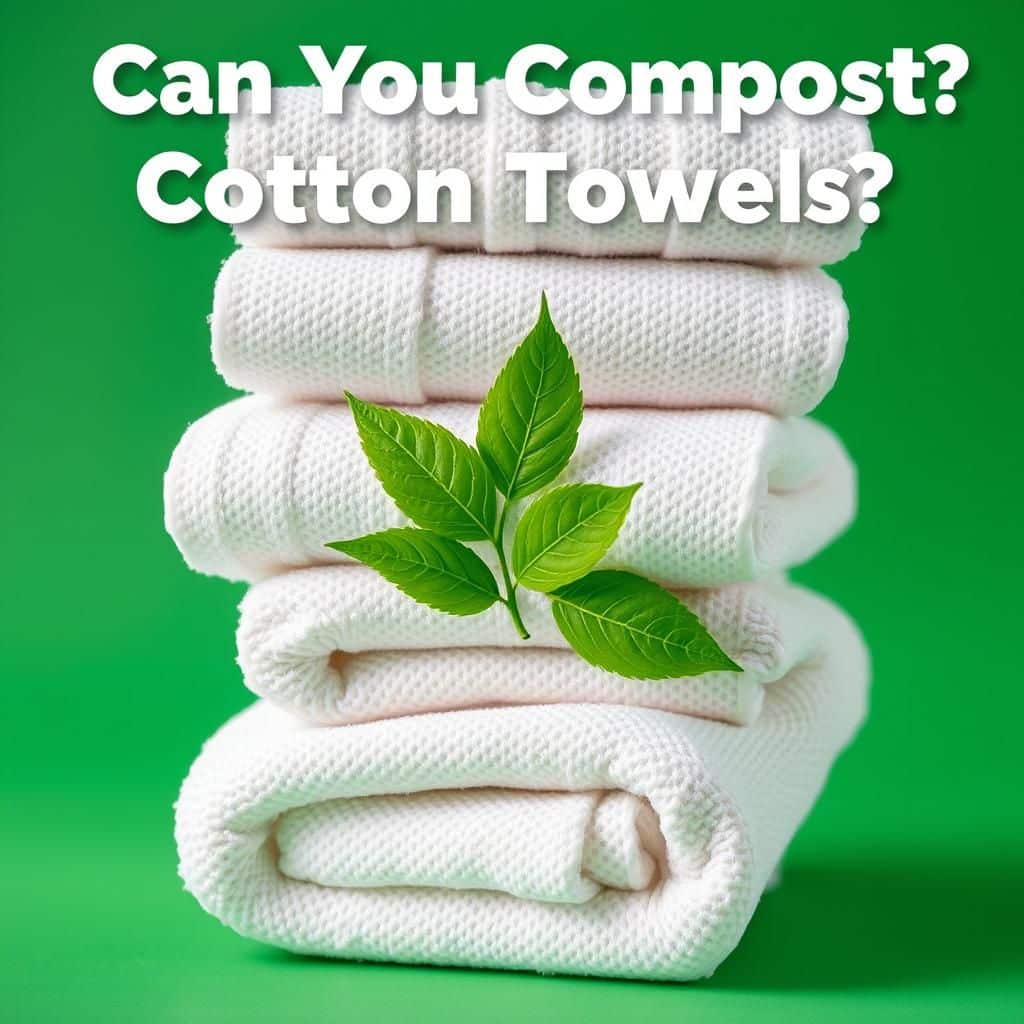Can You Compost Cotton Towels? The Ultimate Guide to Eco-Friendly Disposal

As environmental concerns continue to grow, the topic of sustainable practices in everyday life has gained significant attention. One such practice is composting, a natural way to recycle organic matter and reduce waste. But what about cotton towels, often a staple in households? Can they be composted, or do they belong in the landfill? In this ultimate guide, we will explore the ins and outs of composting cotton towels, including their biodegradability, the right conditions for composting, and alternative eco-friendly disposal methods. Join us on this journey to discover how to make more sustainable choices in your daily life.
Can You Compost Cotton Towels?
Yes, you can compost cotton towels as they are made from a natural fiber that breaks down over time. However, it's important to ensure that the towels are 100% cotton and free from synthetic fibers, which can hinder the composting process. Before adding them to your compost bin, it's advisable to cut them into smaller pieces to accelerate decomposition. Additionally, avoid soaking them in chemical cleaners or fabric softeners, as these substances can introduce harmful elements into your compost. By composting cotton towels, you can contribute to reducing landfill waste while enriching your soil with organic matter when the compost is fully processed.
Benefits of Composting Cotton Towels
Composting cotton towels offers numerous benefits, including reducing household waste and providing rich nutrients to your garden soil. As organic matter, cotton towels break down into compost, which can improve soil structure, enhance moisture retention, and increase microbial activity. Furthermore, composting supports a more sustainable lifestyle by utilizing materials that would otherwise end up in landfills, thus helping to minimize your carbon footprint.
How to Prepare Cotton Towels for Composting
To effectively compost cotton towels, first check for any synthetic materials by looking at the label; only 100% cotton towels should be used. Next, wash them without any harsh detergents or fabric softeners to remove residues that might harm the compost. Once clean, cut or tear the towels into smaller pieces to create a greater surface area for microbial activity, and then add them to your compost pile or bin layer by layer with other brown (carbon-rich) materials like dried leaves or shredded paper.
What Not to Compost with Cotton Towels
When composting cotton towels, it's crucial to avoid adding any items that may disrupt the composting process. Do not include towels made from synthetic blends, as these fibers do not decompose and can contaminate your compost. Similarly, avoid towels that have been treated with chemicals, such as bleach or fabric softener, as they can introduce harmful substances into the final compost product. Also, steer clear of any towels that are heavily soiled with grease or chemicals, as they may attract pests or create unpleasant odors.
See also:
Understanding the Composting Process
The composting process for cotton towels involves microbial breakdown, where bacteria and fungi decompose organic materials into nutrient-rich compost. This process requires the right balance of carbon and nitrogen-rich materials; cotton towels provide a good source of nitrogen. Adequate moisture and aeration are also necessary to encourage rapid decomposition. Over time, through the heat generated by microbial activity, the cotton towels will break down completely, leaving behind dark, crumbly compost that is excellent for gardening and landscaping.
Alternative Uses for Old Cotton Towels
Before deciding to compost, consider other alternative uses for old cotton towels. They can be repurposed as cleaning rags, which reduces the need for disposable paper products and helps save money. Additionally, old towels can be turned into pet bedding, quilt materials, or even used in crafting projects. Such creative repurposing extends the life of your towels while keeping them out of the waste stream, further promoting a sustainable lifestyle.
| Material | Compostable | Preparation |
|---|---|---|
| Cotton (100%) | Yes | Wash, cut into pieces |
| Cotton (blended) | No | N/A |
| Synthetic Fiber | No | N/A |
| Chemically Treated | No | N/A |
Understanding the Compostability of Cotton Towels
When considering whether cotton towels can be composted, it's important to evaluate their composition and any chemical treatments they may have undergone. Pure, unbleached cotton towels without synthetic fibers or harmful dyes are generally compostable, as they will break down naturally and enrich the soil. However, towels that have been treated with chemical additives or contain non-biodegradable materials should be avoided in compost piles. Before disposal, check the fabric composition and the washing process they have undergone to ensure they align with eco-friendly practices.
Benefits of Composting Cotton Towels
Composting your cotton towels not only reduces waste but also contributes to the creation of nutrient-rich compost. As these towels decompose, they return essential nutrients back to the soil, promoting healthier plants and gardens. Additionally, composting encourages sustainable waste management by diverting textiles from landfills, where they may take years to break down. Overall, opting for composting aligns with the principles of reducing, reusing, and recycling in an environmentally responsible manner.
How to Prepare Cotton Towels for Composting
Before adding cotton towels to your compost, it’s essential to prepare them properly. First, ensure the towels are clean and free from any chemical contaminants, such as fabric softeners or stains caused by harsh detergents. Cut or tear the towels into smaller pieces to expedite the decomposition process, and consider mixing them with other compostable materials like kitchen scraps or yard waste to create a balanced compost pile. This will help maintain proper aeration and moisture levels necessary for effective decomposition.
See also:
Alternatives to Composting Cotton Towels
If composting is not an option for your cotton towels, consider alternative methods of disposal. One viable option is donating them to local shelters, animal rescues, or charities that can make use of them. Another approach is repurposing the towels for various household tasks, such as cleaning or crafting. This can extend their lifecycle and minimize the impact on the environment. Recycling is also an option for worn-out towels, as some recycling centers accept textiles, directing them away from landfills.
Environmental Impact of Cotton Production
The environmental impact of cotton production is significant, encompassing aspects like water usage, pesticide application, and land degradation. Growing cotton typically requires extensive water resources, which can lead to water scarcity in areas where it is cultivated. Furthermore, conventional cotton farming often relies on harmful pesticides that can affect local ecosystems. By composting cotton towels, you can contribute to sustainable practices, reducing the demand for virgin cotton and promoting the use of recycled textiles.
What to Avoid When Composting Textiles
When composting any textiles, there are key items to avoid to ensure a healthy composting process. Stay clear of towels containing synthetic materials, such as polyester or nylon, as these do not break down and can disrupt the natural composition of the compost. Similarly, avoid items that have been treated with chemicals, dyes, or stains that may leach harmful substances into the soil. Focusing on pure, natural fibers like cotton, and ensuring they are free from harmful contaminants, is crucial for maintaining a safe and effective composting system.
Questions from Our Readers
Can you compost cotton towels?
Yes, you can compost cotton towels, but it's important to ensure they are made of 100% cotton and free of synthetic materials. Cotton breaks down naturally, making it suitable for composting. However, you should cut them into smaller pieces to speed up the decomposition process.
How long does it take for cotton towels to decompose in compost?
The decomposition time for cotton towels in compost can vary, but generally, it takes several months to over a year, depending on factors like temperature, moisture, and the size of the pieces. To accelerate this process, maintain a balanced carbon to nitrogen ratio and keep the compost pile adequately aerated.
See also:
What are the benefits of composting cotton towels?
Composting cotton towels can contribute positively to your garden by returning valuable nutrients to the soil. As they decompose, they enrich the organic matter in compost, leading to improved soil structure, water retention, and fertility, which benefits plant growth.
Are there any precautions to take when composting cotton towels?
When composting cotton towels, ensure that they are free from chemical treatments like bleach or synthetic dyes, as these can harm the compost. Additionally, it's best to avoid composting towels that are heavily soiled or contaminated with oils or non-biodegradable products, as they could negatively affect the composting process.

If you want to read more articles like Can You Compost Cotton Towels? The Ultimate Guide to Eco-Friendly Disposal, we recommend you check out our Compost category.
Leave a Reply
Related Articles